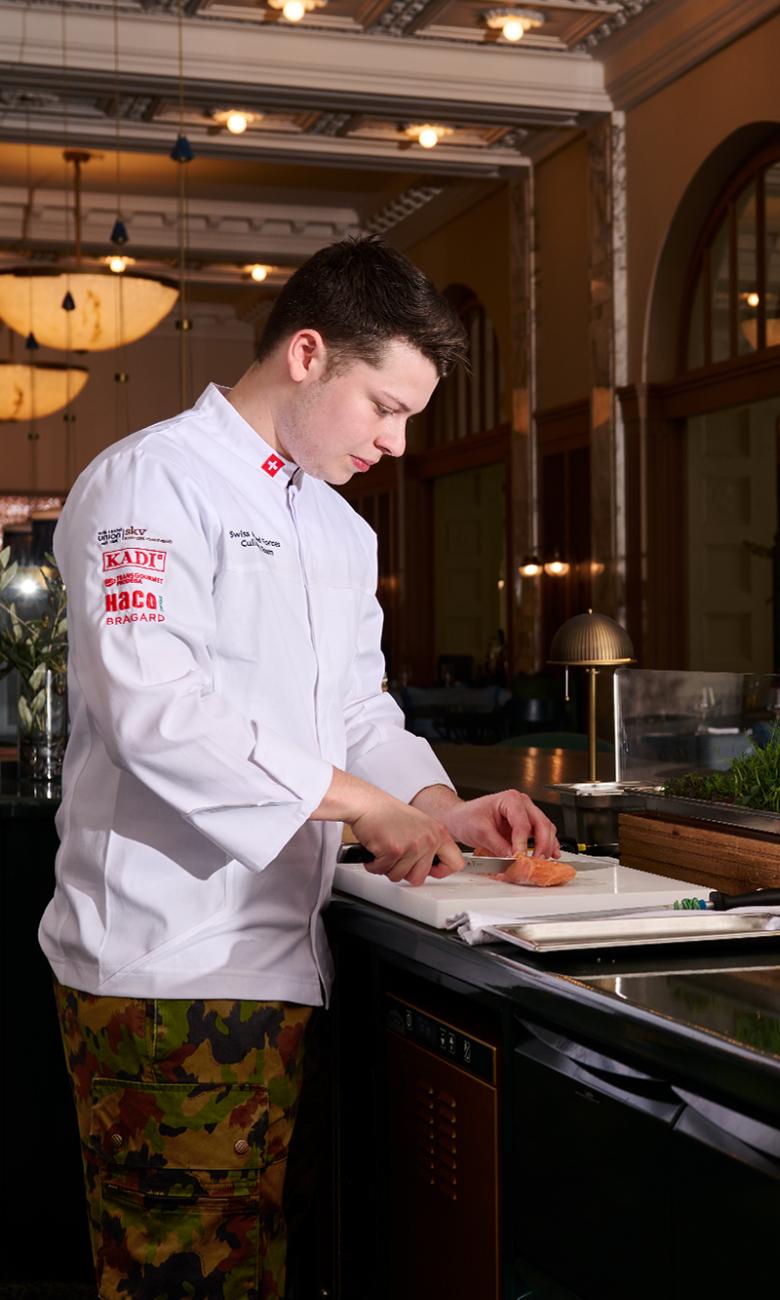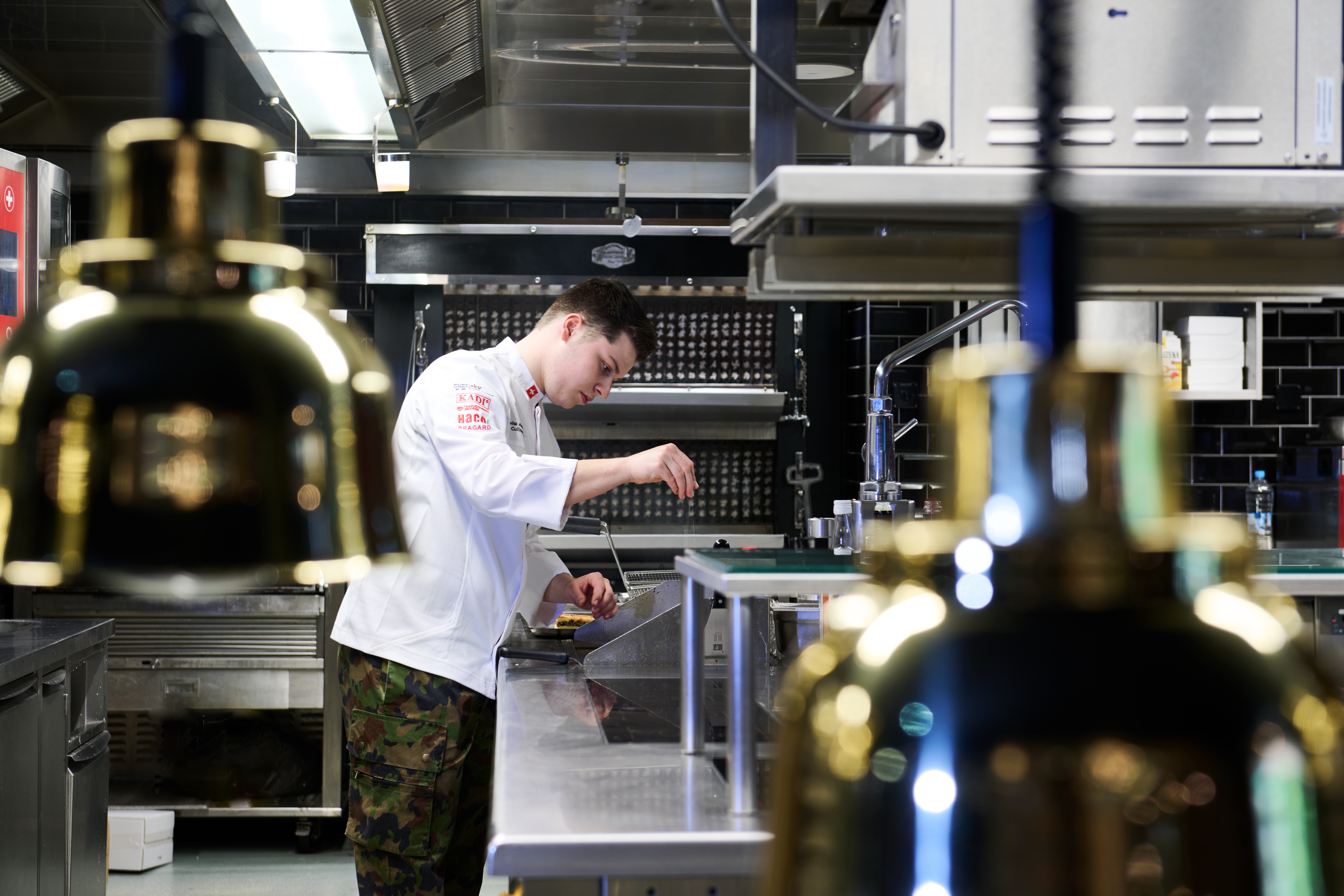Haute cuisine in camouflage trousers: the Swiss Armed Forces culinary team
The Swiss Armed Forces culinary team is repeatedly voted one of the best in its field, often far outdoing non-military culinary teams in international contests. How can that be? The answer lies in the militia system that has shaped Switzerland for centuries.
The Swiss Armed Forces culinary team is repeatedly voted one of the best in its field, often far outdoing non-military culinary teams in international contests. How can that be? The answer lies in the militia system that has shaped Switzerland for centuries.

The list of achievements of the Swiss Armed Forces culinary team (SACT) is impressive:
- World champions at the 2002 and 2006 Culinary World Cup in Luxembourg
- Olympic champions in 2008 and 2012 at the IKA/Culinary Olympics in Erfurt
- Runners-up at the 2010 and 2014 Culinary World Cup in Luxembourg
- Winners of the 2017 army chefs' duel – competing against the German Armed Forces – in Basel
- Winners of the 2018 "Battle of ZAGG" competition in Lucerne
- Best military culinary team and bronze medal (3rd overall) in the Community Catering category (civilian/military – 28 teams participating) at the 2020 IKA/Culinary Olympics in Stuttgart
The Swiss Armed Forces culinary team (SACT), consisting of selected army cooks and trained military chefs, has enjoyed numerous successes since it was founded in 1999.
The team not only represents the Swiss Armed Forces in national and international contests, but is also regularly deployed at public events organised by the Armed Forces. This year, for the first time, the SACT will demonstrate their skills at the World Economic Forum in Davos. At the House of Switzerland, located in the HC Davos ice hockey stadium, they will be cooking for guests from all over the world.
Military service with far more than just standard army catering
Remo Messerli is one of the SACT's 15-strong team of cooks. The 21-year-old works at the Casino in Bern and each year fulfils his military service as an army cook for around 30 days. He is thus emblematic of the vast majority of members of the Swiss Armed Forces. The Swiss militia system means that our country does not have a standing, professional army, but is defended by a people's army in an emergency. This principle has its roots in the Late Middle Ages, when the confederated cantons called for military deployments, mobilising the civilian population for their military operations. Private Messerli will be fulfilling his first military assignment at this year's World Economic Forum in the House of Switzerland. In 2020 he won 2nd place in the cooks category in the SwissSkills annual national competition for apprentices. As a result, he was approached by the head of the SACT to join the team. During his 18-week basic military training at the Thun barracks, he completed not only basic military training but also various further training courses in his specialist field, cooking.

The fact that his military service and civilian working day are very similar does not bother this talented cook: "I was planning to become an army cook anyway and cook for my comrades in a barracks. When I found out that I could be part of the SACT, I was even more motivated to do my military service," he says. The assignment in Davos actually only differs in the kitchen equipment and the work clothes Messerli will be wearing. In addition to the usual camouflage trousers, the SACT uniform includes a white apron with the team's name and some sponsors printed on it.
A change of apron
The fact that his military service and civilian working day are very similar does not bother this talented cook: "I was planning to become an army cook anyway and cook for my comrades in a barracks. When I found out that I could be part of the SACT, I was even more motivated to do my military service," he says. The assignment in Davos actually only differs in the kitchen equipment and the work clothes Messerli will be wearing. In addition to the usual camouflage trousers, the SACT uniform includes a white apron with the team's name and some sponsors printed on it.
Civilian know-how – a guarantee for success
Whether in disaster relief, peace support or international cooking contests, thanks to the militia system the Swiss Armed Forces can count on well-trained soldiers who can put their skills to profitable use. The civilian background is only a prerequisite for (highly) specialised functions, for example in the cyber sector. Nevertheless, a professional or academic qualification usually plays a decisive role in recruitment. Swiss Armed Forces personnel are thus not only going to be providing security at the World Economic Forum, but also some culinary highlights.
National service in the 21st century
Today, the Swiss army is still based on the principle of compulsory military service for all Swiss men. Swiss women can volunteer to do military service. After an information day at the age of 18, a two- to three-day recruitment process follows, during which the young men and women learn which function and military classification they have been assigned. This is followed by 18 weeks of basic military training, during which function-specific skills are also learnt and at the end of which there is a unit-wide exercise. After that, soldiers usually complete six annual refresher courses of 19 days each, until they have fulfilled their military obligation of a total of 245 days of service.



